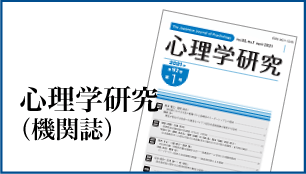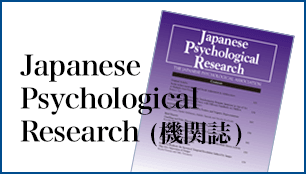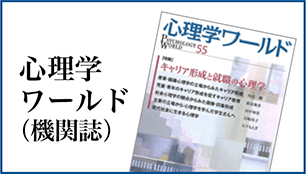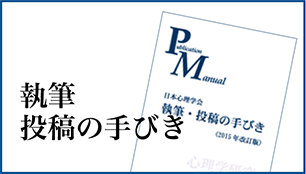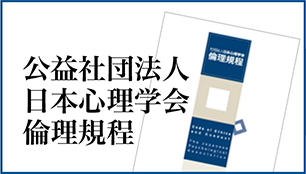- HOME
- 刊行物のご案内
- Japanese Psychological Research
- Special Issues
- Special Issues (JPR68-1)
刊行物のご案内
2026年刊行予定 Japanese Psychological Research 特集号 (Special Issues of JPR)
"Experience Sampling Method" (経験サンプリング法)一般公募について
See below for the English version.
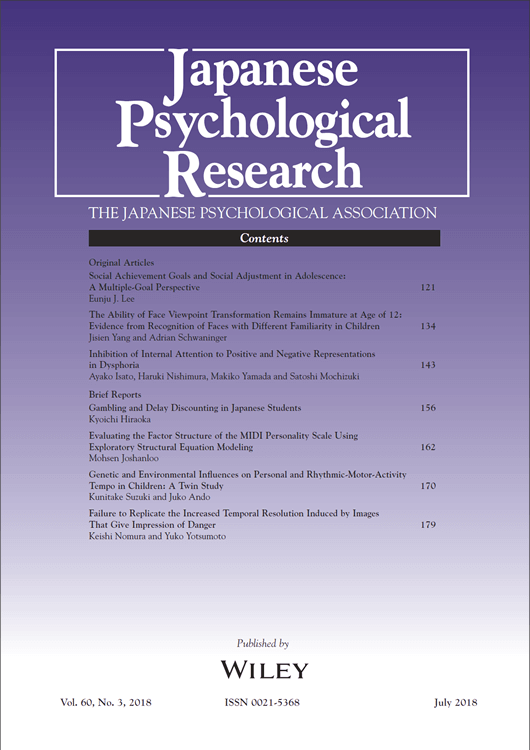
- テーマ:
- "Experience Sampling Method"
- (経験サンプリング法)
- 編集者:
- 尾崎 由佳(東洋大学/日本経験サンプリング法協会)
沓澤 岳(産業技術総合研究所) - 発行予定:
- Japanese Psychological Research Vol.68, No.1 (2026年1月号)
- 事前アブストラクト提出期限:
- 2024年 6月30日
- 事前アブストラクト提出先:
- https://forms.gle/f1PVPiDZoTxZtV3X7
- 投稿締切:
- 2024年11月30日
- 投稿先:
- https://jpa.iap-jp.org/jpr/
経験サンプリング法(experience sampling method; ESM)とは,日常的な生活環境の中で起こる人々の行動・思考・感情について繰り返しデータ収集を行う研究手法のことです。この手法は,日誌法・生態学的瞬間評価法・外来評価法・集中縦断法などとも呼ばれます。
ESMを用いることで,(実験室ではなく)日常生活の中で発生する心理・行動・対人関係に関わる過程の高解像度な時系列データが入手可能になります。この特長により,ESMは1970年代に開発されて以来,心理学の幅広い分野で注目を集めてきました。さらに,近年の技術的進歩により,ESMの有効性は飛躍的に向上しました。スマートフォンやウェアラブルデバイスの普及によって自然環境下での効率的なデータ収集が可能になり,それをサポートする使いやすいソフトウェアも登場しています。いま,心理学を中心に幅広い分野において,ESMへの関心がかつてないほどに高まっています。
ESMに関する詳しい情報は,こちらをご覧ください (https://yukaoz.com/esm)。
本特集号では,ESMを活用した心理学研究についての論文を募集します。データに関しては,高解像度の時系列データという条件を満たすかぎり,多様な測定頻度(例えば,無作為/固定時刻で1日複数回,1日1回,週1回など)で収集されたものを可とします。主観的な測定(自己報告など)に限らず,客観的な測定(生理的指標など)も使用できます。介入研究や,ESMと実験室実験の組み合わせなど,幅広い研究デザインを歓迎します。また,実証的な研究論文だけでなく,理論的な示唆に富むレビュー論文や,革新的な技術・方法論の開発に関する報告も募集します。本特集号の目的は,研究ツールとしてのESMの利点と,この手法が心理学とその関連分野の進歩にどのように貢献できるかについて,統合的な理解を提供することです。
- ・本特集号への投稿を希望する方は,2024年6月30日までにアブストラクト(英文500 words以内)を以下フォームから送信してください(https://forms.gle/f1PVPiDZoTxZtV3X7)。
- ・要旨に基づく採否の審査結果は,2024年7月31日までに通知されます。
- ・要旨が採択となった場合,執筆・投稿の手びきに従って論文原稿を作成し,2024年11月30日の締切までに投稿してください。審査を経て採択された論文は,2026年1月刊行のJapanese Psychological Research, Vol.68 No.1 に掲載される予定です。
- ・本特集号に関する編集者への問い合わせ(論文テーマの適否に関する相談を含む)は,以下フォームからお寄せください(https://forms.gle/ugeU7b9SbYgWMM669)。
Call for Papers: Special issue of Japanese Psychological Research "Experience Sampling Method" Edited by Yuka Ozaki and Gaku Kutsuzawa

- Title:
- "Experience Sampling Method"
- Editors:
- Yuka Ozaki (Toyo University / Japan Experience Sampling Method Association) &
- Gaku Kutsuzawa (National Institute of Advanced Industrial Science and Technology)
- Publication:
- Japanese Psychological Research Vol.68, No.1 (January, 2026)
- Deadline for abstract submission:
- June 30, 2024
- Deadline for full paper submission:
- November 30, 2024
- Submission:
- https://jpa.iap-jp.org/jpr/
The experience sampling method (ESM) refers to a set of research procedures that involve repeated data collection of people’s behaviors, thoughts, and emotions as they occur in their natural environment. These procedures are also referred to as diary method, ecological momentary assessment (EMA), ambulatory assessment, intensive longitudinal method, etc.
ESM enables researchers to have access to high-resolution time series data on psychological, behavioral, and interpersonal processes as they occur in people’s everyday lives, outside of the laboratory. With these unique features, ESM has attracted attention in a wide range of fields in psychology, since it was first developed in the 1970’s. With the recent technological advancements, the effectivity of ESM has been dramatically improved. Widespread use of smartphones and wearable devices has made it possible to efficiently collect data from people in real time in their natural environment, and user-friendly software applications to support the procedure are now available. There is growing interest more than ever before in applying ESM in psychology and its related fields.
This special issue invites papers involving ESM applications in psychological studies. In terms of data collection, we are open to a variety of measurement frequencies (e.g., random/fixed times within a day, or once daily/weekly), under the condition that they provide high-resolution time series data. Procedures may include not only subjective measurements (e.g., self-report), but also objective ones (e.g., physiological index). A wide variety of research designs are welcome, such as intervention studies, or a combination of ESM and laboratory experiments. We invite not only empirical research articles, but also review papers with theoretical implications, as well as reports on innovative technological/methodological developments. The aim of this special issue is to provide an integrative understanding of the advantages of ESM as a research tool, and how this method can contribute to the progress of psychology and its related fields.
- ・Authors who intend to submit a manuscript to the special issue should first submit an abstract (Max. 500 words) for consideration by the 30th of June 2024 through the following online form (https://forms.gle/f1PVPiDZoTxZtV3X7).
- ・Submitted abstracts will be screened for acceptance, and the results will be notified by the 31st of July 2024.
- ・The full paper should be prepared following JPA Publication Manual and submitted by the deadline on the 30th of November 2024. The reviewed and accepted papers will be published in Japanese Psychological Research, Vol. 68 No. 1, scheduled for publication in January 2026.
- ・Inquiries about this special issue (including consultations on the suitability of the topic) can be sent to the editors through the following online form (https://forms.gle/ugeU7b9SbYgWMM669).

